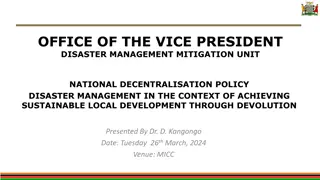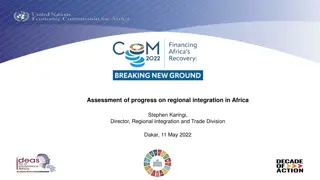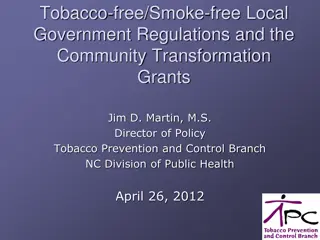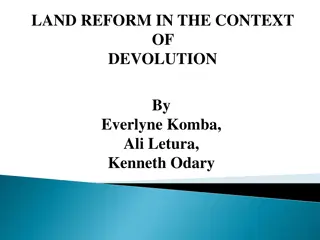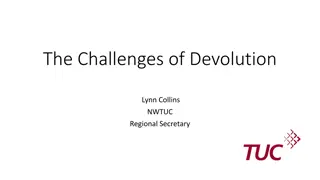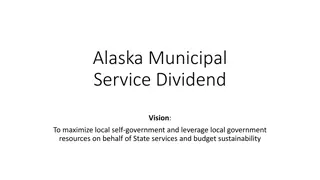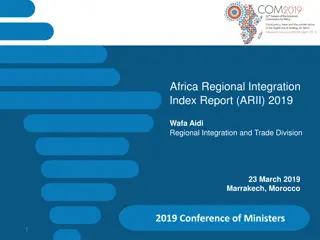New Era in Devolution: Health and Local Government Integration
This report delves into the intersection of local government devolution and integrated care systems (ICSs) in improving population health and prosperity. It emphasizes the importance of visualizing and implementing closer collaboration to better serve communities. The report presents a strategic vision for the future, outlining a three-step approach focusing on local contexts, population empowerment, and holistic health impact. It calls for enhanced leadership, resource allocation, community engagement, and shared decision-making to drive progress.
Uploaded on Sep 22, 2024 | 0 Views
Download Presentation

Please find below an Image/Link to download the presentation.
The content on the website is provided AS IS for your information and personal use only. It may not be sold, licensed, or shared on other websites without obtaining consent from the author. Download presentation by click this link. If you encounter any issues during the download, it is possible that the publisher has removed the file from their server.
E N D
Presentation Transcript
Our report in summary Prevention, population health and prosperity: a new era in devolution Exploring the priorities, opportunities and challenges in bringing together health and local government devolution Michael Wood, Head of Health Economic Partnerships @NHSLocalGrowth
Contents Executive summary 3 Securing a broad understanding, agreeing a collective voice 4 Our ambitions and purpose 5 What is English devolution and what does it mean to ICSs? 6 12 Why should ICSs and combined authorities work together to jointly improve health and support economic prosperity? How can ICSs and combined authorities maximise their collective impact for their shared populations? 14 What should the government do to support and accelerate the health and devolution agenda in the future? 26 28 In their own words 31 Conclusion, final thoughts and further information 2 Unlocking the NHS s social and economic potential: creating a productive system
Home with solid fill Executive summary Key points This report highlights the growing parallels between local government devolution and integrated care systems (ICSs), in terms of a genuine and shared interest in geography, place, role, purpose and outcomes. Devolution is already integral to many ICSs, with leaders now asking how they can deepen their work to best serve populations. It is important leaders are able to visualise, comprehend and explain what closer, more effective integrated working could feel like for colleagues on the front line and what it would mean for local populations. This report articulates a new central vision for the shared future for health and devolution. Local leaders will be required to implement this vision according to their own context and nuance. We believe making this new vision for health and devolution a reality will require a phased, three-stage approach, developed through coordinated local leadership and sustained national support. These three steps include: focusing on people and the places where they live and work; supporting populations to improve their own health; and recognising that everything has an impact on health. For each step, the report sets out context, findings, national recommendations, local priorities and case studies. Delivering on these steps will involve stretching what we can do within existing frameworks, duties and powers, before understanding what is needed to go further; increasing and resourcing local capacity and capability; focusing on community engagement and empowerment; understanding and using soft power and system working; and above all, consistently engaging and co-developing a future of shared thinking, projects and positions. The timing of this report is important. There is a narrow window open in which to simultaneously look back and learn from past approaches to devolution, but also look forward at what a more standardised approach to decentralisation might look like, before various reforms make merging these areas too complex. What? Why? How? What more? What is English devolution and what does it mean for an ICS? Why should ICSs and combined authorities work together to jointly improve health and support economic prosperity? How can ICSs and combined authorities maximise their collective impact for their shared populations? What should the government do to support and accelerate the health and devolution agenda in future? Prevention, population health and prosperity: a new era in devolution 3
Home with solid fill Securing a broad understanding, agreeing a collective voice The NHS Confederation and the Local Government Authority (LGA) created a Health and Devolution Working Group in spring 2023. The working group brought together integrated care board (ICB) and integrated care partnership (ICP) leaders from those ICSs directly impacted by existing and/or emerging devolution deals and external experts from a range of sectors and organisations who have either specialist knowledge of devolution or are in a position to influence future policy development in this space. Over a period of six months the working group met four times. Health and Devolution Working Group ICS and Local Authority Executive Working Group members Subject-matter Expert and Policy Working Group members Sir Richard Leese, Chair, Greater Manchester Integrated Care Board The working group is also comprised of a broad and diverse group of experts, drawn from: ICSs with an existing or emerging devolution deal within their geography Co-chairs central government Local government devolution leads Dr Kathy McLean, Chair, Nottingham and Nottinghamshire ICB and ICP local government ICS representatives are drawn from a mixture of ICB, ICP and ICSs. the NHS academia industry. Informing practice, making recommendations, starting an on-going conversation Bringing system leadership together with subject matter expertise and policy oversight Prevention, population health and prosperity: a new era in devolution 4
Home with solid fill Our ambitions and purpose Help leaders understand more about commonalities in recent reforms, including key partners, issues and why this matters. Support closer working and better navigation between ICS and devolved arrangements. Make national recommendations to the government and to other bodies and highlight principles of good local working, including good practice and case studies. Build up and continue the conversation with and between NHS Confederation and LGA members, including feeding into further policy and influencing work. Develop a space where we can provide continued updates, guidance, support and advice as these reforms develop. Help the culture shift needed to unlock local leadership and use autonomy for shared populations. Prevention, population health and prosperity: a new era in devolution 5
Home with solid fill What more? How? What? Why? What? What is English devolution and what does it mean for an ICS?
Home with solid fill What more? How? What? Why? Health and devolution: understanding the background to devolution Devolution in England is the delegation of powers, programmes and funding from national government, in Westminster, to local government. As of November 2023, devolution deals have been agreed with 17 areas in England. This trend is set to continue and accelerate. The 2022 levelling up white paper set out the mission that by 2030 every part of England that wants one will have a devolution deal. Labour has also committed to further devolution. For this form of devolution, powers must be transferred to a body with a leader who is directly elected by the local population. This will normally mean the establishment of mayoral combined authorities (MCAs) by two or more local councils, which are statutory bodies led by a locally elected mayor. Powers can also be transferred directly to councils with a locally elected leader, as is the case in Suffolk, Norfolk and Cornwall. Although the government has not definitively stated the key purposes of devolution, successive government policy often identifies three overarching principles: economic growth better and more integrated public services enhanced public engagement and accountability. Prevention, population health and prosperity: a new era in devolution 7
Home with solid fill What more? How? What? Why? Health and devolution: typical devolution powers and programmes Typical devolution powers for a combined authority: There are a number of powers and budgets that have been made available to most areas in devolution deals since 2014, largely focused on boosting local economies. Investment funds: 30-year investment fund, equating annually to between 15 million and 38 million for each combined authority. Recent trailblazer deals have expanded the responsibilities of some MCAs in the areas of transport, adult education and housing. Importantly, these deals commit to providing a single funding settlement in the 2025 Spending Review, akin to the method of funding of government departments. Adult Education Budget (AEB):Funds education and training course for adults aged 19 and over. Business support: Growth hubs which help local businesses access services. Fiscal powers: In addition to the power to impose a precept on council tax bills, most combined authorities retain all business rate revenues collected in their area. Further special powers have been offered to a limited set of MCAs. These include powers relating to police and fire, justice, housing, and health. Transport: Most devolution deals have included a multi-year transport investment budget. Planning and land use: Many combined authorities have the ability to create spatial plans for the use of land. 8 Prevention, population health and prosperity: a new era in devolution
Home with solid fill What more? How? What? Why? Health and devolution: where does health feature? East Midlands devolution deal The GMCA and GLA were the first devolved bodies with responsibilities for the health of their local populations. However, new devolution deals such as East Midlands and North East explicitly mention health, and the levelling up framework allows for an explicit public health duty for level 2, 3, and 4 deals. To complement and support action by the constituent councils, the East Midlands MCCA will take on a local authority duty to take action to improve the public s health concurrent with the constituent councils. This will allow health to be considered throughout the East Midlands MCCA s activities as well as enable work on local issues where health plays a key role, for example tackling homelessness and rough sleeping. The devolution framework keeping the public safe and healthy Gov.uk (2022), Policy Paper: East Midlands Devolution Deal Detail L1 L2 L3 L4 North East devolution deal Mayoral control of Police and Crime Commissioner (PCC) functions where boundaries align.^ X X The North East devolution deal has an explicit section on public service reform, which incudes a focus on: Mayoral control of Fire and Rescue Authority (FRA) functions where boundaries align.^ X X place-based health and care, with a new ICS-devolution region-wide approach to social care collaboration, the health and social care workforce, and market shaping Clear defined role in local resilience.* X X X healthy ageing, exploring, with partners, potential for a new golden triangle to develop stronger partnerships between the North East, Edinburgh and Glasgow Where desired, offer MCAs a duty for improving the public s health (concurrently with local authorities). X X X (*) refers to functions which are only applicable to combined authorities as opposed to county councils. (^) refers to functions which are only applicable to mayoral combine authorities. population health, developing a Radical Prevention Fund that will reshape existing funding away from acute services and into preventative action. 9 Prevention, population health and prosperity: a new era in devolution
Home with solid fill What more? How? What? Why? English sub-national governance: an ever-changing patchwork 10 Prevention, population health and prosperity: a new era in devolution
Home with solid fill What more? How? What? Why? Metro mayors: a new form of place leader A metro mayor is the directly-elected leader of an area and chairs the combined authority. What are the mayor s priorities and how can you support their delivery? Who should the mayor s office liaise with? They have varying degrees of executive power and funding over a range of differing areas, including skills, business support and transport, and in some cases crime and health. Many metro mayors have a health interest: In most areas, they have an effective veto over decisions made by the combined authority, while the Mayor of London can take decisions without reference to the London boroughs. Dr Nik Johnson, Mayor of Cambridgeshire and Peterborough, is a consultant pediatrician. Andy Burnham, Mayor of Greater Manchester, is a former Secretary of State for Health. Where the elected mayor is also the Police and Crime Commissioner (PCC) for the area, they also have the PCC s power to raise a precept. Oliver Coppard, Mayor of South Yorkshire, chairs the South Yorkshire ICP. Metro mayors can appoint deputy mayors and hand them certain functions. Claire Ward, Mayor of East Midlands, was formally chair of Sherwood Forest Hospitals NHS Foundation Trust. Including the Mayor of London, 50 per cent of the population of England, or 27.7 million people, have a metro mayor. The 11 metro mayors in England have differed considerably in the priorities and activities undertaken since their election, with their convening and soft power increasingly recognised, even in areas where they have no power. What positions can you offer the mayor? What issues can the mayor s soft power help resolve? 11 Prevention, population health and prosperity: a new era in devolution
Home with solid fill What more? How? What? Why? Why? Why should ICSs and combined authorities work together to jointly improve health and support economic prosperity?
Home with solid fill What more? How? What? Why? Devolution and ICSs: where the train tracks meet ICS fourth purpose a formal responsibility More CAs taking on health powers Increasing local autonomy Inclusive growth now a part of local growth planning Population health vital for prosperity ICSs MCAs Levelling Up Mission on Healthy Life Expectancy Anchor systems and strategies being developed Place in policy 13 Prevention, population health and prosperity: a new era in devolution
Home with solid fill What more? How? What? Why? How? How can ICSs and combined authorities maximise their collective impact for their shared populations?
Home with solid fill What more? How? What? Why? A new vision for health and devolution It is important when seeking to understand the connections between health and devolution that leaders are able to visualise, comprehend and explain what closer, more effective integrated working could feel like for colleagues on the front line and would mean for local populations, whether in rural or urban settings. This increased autonomy begs the question of what it is you want to achieve? The roundtable discussions that informed this report were clear that a new vision was the timely, first step in reimagining the ICS-combined authority relationship and in articulating the shared future for health and devolution. 3. Being clear what the ICS-devo relationship can offer national government can secure our future 1. Working together for our shared populations can deliver greater impact than the sum of our parts 2. Aligning health and devolution can reconcile the differing national and local perspectives of the future of health and care At the core of the ICS-devo offer to national leaders should be a richer understanding of place-based connections, the supplementary evidence and nuanced understanding of what works over a longer time period of between ten and 20 years and in different local economies, and a greater insight into the nature of the interactions between separate policy areas and government departments. Resolving contradictions in national and local prioritisation will require deliberately open and careful local partnership working, particularly through the ICS-devo relationship, to support new approaches to place-based service planning and delivery, to advocate collectively across and within areas, to facilitate the sharing of resources and ideas, and to build trust between traditional and new partners that challenge protectionist behaviour or policy failures. The spirit required to bind closely systems must be one of stronger together . In this context, aligning health and devolution enables organisations and individuals to push into the areas that matter to keep people healthy and prosperous, and where they previously may have felt permission was needed to engage. 15 Prevention, population health and prosperity: a new era in devolution
Home with solid fill What more? How? What? Why? A new vision for health and devolution 5. Understanding the counterfactual of not aligning health and devolution will escalate the pace of change 4. Modelling a new way of working which places health and care at the heart of broad strategy can help our populations and our partnerships prosper The ICS-devo relationship is perhaps the most important lever in escalating the pace of change at which we operate and through which we can truly move on prevention and population health. This will require real will and challenge from leaders, including being more vocal with each other, with local partners and with national government about the consequences of not acting to deliver this future. An empowered ICS and combined authority partnership is vital in ensuring the sustainability of our public services, but also that they engage and support communities in new, thought-provoking ways that make clear the choices involved. Further calls for increased autonomy for ICSs will need a strong evidence basis on which to build. Alignment on health and devolution will enable ICS leaders to showcase the potential of this tier of administration, themselves modelling new ways of working, including peer-to-peer support and learning, and co-developing strategy that is health related and cross-Whitehall, rather than simply isolated NHS policy. In doing this, the model of English devolution can be shifted away from its explicitly economy-based roots. Prevention, population health and prosperity: a new era in devolution 16
Home with solid fill What more? How? What? Why? Delivering on the new vision for health and devolution While this central vision can underpin health and devolution more broadly, local leaders will be required to implement it according to their own context, recognising both the complexity of their system but also how these complexities themselves vary. We believe making this new vision for health and devolution a reality will require a phased, three-stage approach, developed through coordinated local leadership and sustained national support. Our report proposes the following three key steps in this journey: 1 3 2 Focus on people and the places where they live and work Support populations to improve their own health Realise everything has an impact on health Better understanding of communities is shared need. ICS and devolution reforms face same way with health and prosperity key. No standard operating model. Gathering evidence is vital. Devolution should clarify the roles of partners and add value to place. Align local leadership around policy, investment and service spec. Need to use existing agency, powers and resources much more effectively. Focus on spatial awareness. Capabilityand capacity need prioritising locally and nationally. 17 Prevention, population health and prosperity: a new era in devolution
Home with solid fill What more? How? What? Why? Step 1: Focus on people and the places where they live and work The starting point is a real and sustained focus on the centrality of place and the people within. Geographies may not always be co-terminus, but there will be shared places and populations that an ICS and CA collectively serve and/or represent. This one constant can bind the local focus and prioritisation and unite an ambition, around which a compelling case for devolution to best support them can be made. Key points People Place There is a requirement to better understand communities and to focus work alongside place, people and partners, rather than from an organisational or sector perspective. In doing so, a new sub-national approach to spatial issues such as accountability, financing and regulation may emerge. Focusing on getting the best outcomes for the shared communities you serve, rather than for your own organisation or sector. Make place the starting point for all devolution discussions it is meaningful to local people in ways that combined authorities and ICSs are often not. Devolution can clarify the roles and reach of individual partners, including how ICSs and CAs can add value to place-based partnerships, and their contribution to building a long-term route-map for integrating public services and empowering citizens. It also can help understand what more is needed to accelerate local progress. Ensure joint community engagement is purposeful, ongoing and acknowledges the diversity of perspectives. Develop place-based strategic approaches which commit local partners to joint policies and working. Build on what works for local people; adding value, revising and improving only where necessary. Be smarter with your spatial understanding and what you can collectively do, given subsidiarity is not linear. There is a need to be much smarter with the spatial understanding of what can best be done at which level. 18 Prevention, population health and prosperity: a new era in devolution
Home with solid fill What more? How? What? Why? Step 1: Focus on people and the places where they live and work People Place In the continued absence of a robust, standardised place approach to development or measurement, a focus on shared local outcomes can anchor joint discussions around strategy, priorities and delivery, and support constituent partners to be less protectionist. Place is still where much of the actual delivery of public service provision happens and where integration, or the lack of it, is most noticeable to colleagues and communities. The very principle, and test, of subsidiarity is place by default and this should underline all policies, decisions and delivery. The new structures themselves can also suffer from a lack of public awareness. Better engagement and a stronger focus on storytelling, including through local media, can help explain to populations what devolution and integrated care means for them, bringing people on the journey and improving outcomes. In some cases, places are building on anchor networks local partners have established, in others using missions-based approaches. Integral to the success of these methods are innovative forms of community engagement and data through which to better understand each other and the locality. There is often a tendency when setting up new structures to start again , overlooking what is already working well or simply requires support, readjustment or gradual evolution. While some combined authorities are seeking legal responsibilities for public health this does not mean that a duty necessarily needs to be taken away from elsewhere. Combined and local authorities, public health directors and ICSs can concurrently, and successfully, hold related powers, but it is important they understand the differing spatial values involved and agree how they will best use them. Prevention, population health and prosperity: a new era in devolution 19
Home with solid fill What more? How? What? Why? Step 2: Support populations to improve their own health Building on and baking in the centrality of place and people will require the partnerships and powers required to truly invert traditional ways of working. With the short-term demands on public services increasing, there is a need for a renewed, collective ambition and purpose to help populations themselves to improve their own health, rather than see statutory services continue to try to do it to communities. Key points Partnership Powers Emerging health and devolution policy clearly face the same direction with prevention, population health and prosperity central to the collective aims and success. Create the capacity, resource and time necessary to fully embed community engagement, relationship building and collaboration at all levels. Focus explicitly on both health in all policies and health policy in determining what is best to support and empower communities. ICSs and CAs need to use their existing collective powers, agency and resourcing more effectively, pooling where appropriate, and focusing on common challenges not waiting for permission from government or national agencies to stretch what they can already do. Be transparent about the ICS-devo partnerships and who you work with and why, including who benefits and how. Do not wait for permission from the government and NHS England to use your existing powers. Prioritise shared data about public services and populations, not just local government and the NHS, as a key enabler to unlocking the potential. Ensure proposals for future devolution deals involve health and build on the evolve developments that are long-term, evidence-based and multi-sector. Realising this potential will require capability and capacity building at the ICS and CA level. The necessary headspace required to understand community need, and to coordinate and collaborate on policy and implementation response, is no longer present in many areas. Prevention, population health and prosperity: a new era in devolution 20
Home with solid fill What more? How? What? Why? Step 2: Support populations to improve their own health Partnership Powers Devolved working requires new approaches to, for example, community engagement, relationship building and collaboration, and it will simply not reach its potential without dedicated local capacity, resource and time. Stress-testing current policy areas will help understand how the anchor role of the NHS can support a greater impact on, and connect, communities; how differences in the implementation of policies can affect health in a positive way; and where the gaps are for which a specific focus on devolving health policy can help. ICS and combined authority leaders are unique in the combination of macro and micro perspectives. Systems are learning how to face each other but collectively they also have a key role in empowering and supporting place-based collaborations below and in negotiating with government and national agencies above. New powers may well be needed and sought to help achieve this, but the wellbeing power and general power of competence that ICS and combined authorities already collectively hold is significant. Understanding what can be done and supporting each other to share and use this effectively is vital. As the use of data broadens and analytical capabilities grow, there will likely be a greater appetite to break down populations to identify those most adversely affected or to target population groups to develop new policy or seek new powers around. While the NHS has suffered from severe bouts of short-termism, ICSs need to be looking to the future, using the 30-year devolution window to advocate for much longer-term vision and focus. 21 Prevention, population health and prosperity: a new era in devolution
Home with solid fill What more? How? What? Why? Step 3: Recognise that everything has an impact on health With a common view of populations and a renewed vision to better enable their health comes a much richer understanding of how working together can really deliver change. We do not have to make the case for health in all policies it is already there in strategy, in spirit and in delivery. The challenge is to be more explicit and intentional about understanding the interactions in devolved policy, to measure and account for the health implications of all policies, and to develop collective responses to support shared populations to live healthy, prosperous lives. Key points Productivity Process There is no one standard operating model that can fit every emerging devolution and ICS arrangement. Local leaders are best placed to determine their own approach, using a common focus on mission, vision, behaviours and values. Support a better shared understanding of the strategic financing and funding of place. Make mission, values and behaviours the critical local building blocks and learn from one another. Change the nature of the local fiscal conversation to increase opportunities to locally attract and direct funding. See devolution as providing the roadmap to deliver truly preventative services, linking various strategies with operational delivery. The need to continuously gather evidence of why local leadership best serves communities is crucial, including aligning local data and intelligence capacity with a focus on evaluation, measuring shared outcomes and impact. Reframe the approach taken to business case appraisals and guidance development to assess the impact on health outcomes. Collectively articulate why local decision-making is best for the health of communities and wealth of the national economy. Securing and aligning local leadership control and accountability over the three areas of policy, investment and service specification has been seen in other sectors to result in better outcomes, including financial returns. 22 Prevention, population health and prosperity: a new era in devolution
Home with solid fill What more? How? What? Why? Step 3: Recognise that everything has an impact on health Productivity Process Knowledge of local money flows within and between sectors is often limited, significantly reducing the ability to best use and influence the finite resources across a place; challenge existing thinking and spending where it is not fully effective; and bring in external finance partners through new whole-system plans. Developing an operating model will take time and a consistent, constant and concerted effort to get there and will draw heavily on the experience of those translators in local positions who work across sectoral boundaries. This relationship can also simplify the institutional landscape and enable greater clarity on the specific role that, for example, the ICS, NHS, MCA, CCA, local authorities and partners can and should all play in this shared yet complex journey, understanding each other and mapping it out. The relationship between combined authorities and investors is an area of growing focus and support from an ICS can be critical in helping develop investible local propositions in the population health space that will be of significant interest to private finance. The relationship between the centre and local can ebb and flow, and leaders should look to reflect on who they need to influence and make every contact count when talking to government. We need to accelerate the shift to value-based funding, with formal, technical business cases for investment becoming a more standardised part of developing and appraising local policy and outcomes, and thus delivering change. 23 Prevention, population health and prosperity: a new era in devolution
Home with solid fill What more? How? What? Why? Health and devolution in practice: emerging case studies Summarised in this report are examples of emerging practice from across the country, which can help ICSs and combined authorities visualise what progress may look and feel like: Prevention is a thread running through the North East devolution deal as well as the priorities of the new North East and North Cumbria Integrated Care Board. The North East devolution deal outlines the intent to establish a programme of public service reform (PSR). Example priorities are presented in the deal for consideration, including: ICP a genuine public health partnership for the region, supported by the convening power of the mayor. He remains the only metro mayor to serve as ICP chair. One of the mayor s first steps as ICP chair was to commission an independent panel review into what needed to be done differently to truly tackle health inequalities. The panel brings together university, local authority, NHS, business and community groups, as well as the Health Foundation and Institute of Health Equity. 3 2 1 Working Well, commissioned by Greater Manchester Combined Authority, supports residents at risk of or experiencing long-term unemployment. It is grounded in the principle that good work is good for your health . Working Well data suggests unmet need in relation to oral health and employment, with participants living in pain and feeling embarrassed about their teeth, impacting on their wellbeing and ability to move into work. This provides a notable example of the integrated approach to health, skills and employment that is adopted by Greater Manchester. The joint working goes beyond engagement and strategy, reaching into investment and delivery to improve outcomes for residents. When Oliver Coppard became Mayor of South Yorkshire in May 2022, one of his first decisions was to take on the chair of the new South Yorkshire Integrated Care Partnership (ICP). Oliver s stated ambition was to test whether the new ICPs could offer a sincere moment of change . South Yorkshire has worked to make the place-based approaches to health prevention in public safety a regional approach to address public service workforce issues and a dedicated radical prevention fund. Prevention, population health and prosperity: a new era in devolution 24
Home with solid fill What more? How? What? Why? Health and devolution in practice: emerging case studies Summarised in this report are examples of emerging practice from across the country, which can help ICSs and combined authorities visualise what progress may look and feel like: 6 5 4 In its mission to promote economic growth, there is recognition at West Midlands Combined Authority (WMCA) that this must be inclusive growth with improved health and wellbeing a key pillar. WMCA has made strides by leveraging its devolved responsibilities in skills, transport, housing, and the environment to improve health and aim to reduce the region s longstanding health inequalities. Moreover, the partnership with the ICS highlights the WMCA s dedication to collaborative efforts in health improvement. By aligning with the ICS, the WMCA ensures that health considerations are seamlessly integrated into broader policy areas, fostering a comprehensive approach to health and wellbeing across the region. In June 2023, West Yorkshire Combined Authority received a partnership agreement and report on determinants and inclusion partnership working. In September 2023, the partnership agreement was signed between WYCA and West Yorkshire ICB, as partners committed to improving the physical, mental, economic and social wellbeing of people in West Yorkshire. The agreement sets out a set of shared commitments to working together on the factors that affect population health and reciprocal governance arrangements. Recent joint appointments have been made for inclusivity champion and associate director for improving population health. As ICS and combined authority spending is directed towards more cost-effective interventions, it becomes increasingly important to understand the wider costs and benefits of every policy intervention. The TRUUDHealth Appraisal of Economic Systems (HAUS) tool allows policymakers to clearly see the societal cost of urban development policies in terms of their impact on public health. This has the immediate benefit of being able to avoid those policies that may seem economically viable but on closer inspection will actually be more costly in the long term due to their impact on public health. Prevention, population health and prosperity: a new era in devolution 25
Home with solid fill What more? How? What? Why? What more? What should the government do to support and accelerate the health and devolution agenda in future?
Home with solid fill What more? How? What? Why? National recommendations accelerating the journey Step 1 Step 2 Step 3 Focus on people and the places where they live and work Support populations to improve their own health Realise everything has an impact on health Rationalise and reduce national targets and priorities, empowering ICSs and combined authorities to identify their own through facilitating better data collection and sharing across public services. Give local ICS and combined authority leaders the freedom and flexibility to determine and embed an operating approach that works for their areas. Offer formal and coordinated support on embedding health as part of the commitment to offer all of England the opportunity to benefit from a devolution deal by 2030. Ensure associated national targets and priorities are aligned, supported by a forum bringing together senior officials from departments with a shared interest in the agenda and ICS and combined authority representatives, as well as key local partners and wider stakeholders. Ensure the business case and appraisal processes used by departments and national agencies supports new ways of working and embeds financial health costs and benefits, and the wider return on investment. Work with partners such as the NHS Confederation and the LGA to build a strong evidence base to support joint ICS-devo investment in preventative models of care. Proactively engage with ICSs and combined authorities collectively when agreeing new approaches to key issues such as accountability, including delivery of the levelling-up missions and the future role of the Office for Local Government (Oflog). Prioritise place-based approaches to policy, leadership development and funding, building up the joint capabilities of local ICS and devolution leaders to maximise their greater autonomy. Prioritise funding to support the capability and capacity of local ICS and combined authority partnerships to deliver for their populations 27 Prevention, population health and prosperity: a new era in devolution
Home with solid fill Caret Right with solid fill In their own words
Home with solid fill Caret Right with solid fill In their own words: what our leaders said The reforms face the same way, but it s important to remember that how we got here differs. Everywhere became an ICS whilst areas have had to fight to achieve devolution. Understanding this push-pull nature helps us understand each other better. Businesses are strong supporters of devolution. We want partners, including the NHS, to have the freedom and resources to express their need and take long-term investment decisions for their communities. A benefit of greater health devolution is that we can point to a wider range of outcomes, meaning conversations with government departments are not in isolation. Co-terminosity is hugely helpful, or course, but it is not critical. Many countries face this issue, and every tier of working will have some form of geographic overlaps and misalignment. Start with the population. Devolution allows everyone to have input to the wider social and economic determinants. We need to simultaneously think about what we are offering to the government and how we are supporting local boards. We need to regularly evaluate the impact that devolution has had on the health of the population. What policies have had the most impact, both health specific and otherwise? We need a far better understanding of our collective powers, breathing space and resourcing. This will help us develop positive, impactful relationships and reduce duplicity. ICSs are not ends in themselves it s about getting the best possible outcomes and having a shared focus on people who live in places, not systems. Funding is typically distributed in pre-determined ways, which then operate in silos. Devolution should allow us to develop broader, shared outcomes which will naturally challenge existing money flows and enable much more effective use of them. We need to keep asking questions of each other. This is a way of working, not a defined end point. 29 Prevention, population health and prosperity: a new era in devolution
Home with solid fill Caret Right with solid fill In their own words: what our metro mayors are saying Poor health often blights our poorest communities. It places an unsustainable burden on public services and damages our chances for economic growth. Most importantly, it ruins people s lives. One of my manifesto commitments was to make South Yorkshire the healthiest region in the country. I don t underestimate the scale of that ambition but there is nothing inevitable or insurmountable about our poor outcomes, they are a policy choice, the result of decisions that have been made locally and nationally over generations. If we are going to overcome those challenges together, we simply must do things differently. As Mayor of Cambridgeshire and Peterborough, it is my belief that we should all have every opportunity to succeed. I want to see our region made sustainably and equitably prosperous. As a doctor, I know that prosperity and health are interconnected. And, as a fan of the Marmot Review, I understand how hard it is to achieve one without the other. While making us better is the responsibility of our National Health Service, as a mayoral combined authority, we can help people stay well in the first place. Though not a healthcare provider, we must embrace the enormous public health implications of our work. Indeed, this is why I champion integrated care systems and value enormously the insights and expertise of our world-class health partners. It s why, in pursuing the types of universal solutions central to Marmot s Fair Society, Healthy Lives report, a vastly improved public transport network is perhaps my and this organisation s primary focus. Oliver Coppard, Mayor of South Yorkshire and Chair, South Yorkshire ICP Dr Nik Johnson, Mayor of Cambridgeshire and Peterborough 30 Prevention, population health and prosperity: a new era in devolution
Home with solid fill Caret Right with solid fill Conclusion, final thoughts and further information
Home with solid fill Caret Right with solid fill Conclusion We strongly believe that: health, and health metrics, should be prioritisedby the government as a formal part of negotiations for future devolution deals, given its importance for and relevance to economic prosperity, the growing interest from system leaders and the clear commonalities in ongoing reforms the ICS-combined-authority relationship should be recognised by the government and national bodies as one of equals, fostering a mature, two-way relationship and acknowledging the support needed to ensure system leaders have the capacity and capability required to best deliver on their potential while no universal operating model to align health and devolution locally exists, it is important ICSs and combined authorities create a positive vision for integration for their local populations, underpinned by a series of thematic priorities which can guide leaders on where and how best to work together. Prevention, population health and prosperity: a new era in devolution 32
Home with solid fill Caret Right with solid fill Final thoughts This report provides a comprehensive framework for how leaders on the front line of public services can collectively realise the benefits of health devolution. We lag behind the vast majority of OECD countries when it comes to decentralisation more broadly, but also in regard to the functioning of our healthcare system. We can and should learn from these and other approaches being taken, including other city region mayors. Oversight of progress will be important. The DHSC, NHS England, LGA and the NHS Confederation s ICS Network have developed a national ICP Forum which they will run jointly. We believe health and devolution should feature strongly in this forum s priority work and focus. The future of the devolution agenda is of broad interest and health needs to be engaged. Future deals may well have an increasing focus on issues such as rurality and scrutiny. Similarly, there has been growing talk of fiscal devolution, with local areas retaining more of the local economic growth they themselves generate. Delivering on this report will involve stretching what can be done within existing frameworks, duties and powers; increasing local capacity and capability; focusing on community empowerment; understanding and using soft power and system working; and consistently engaging and co- developing a future of shared thinking, shared projects and shared positions. The timing of this report is important. There is a narrow window open in which to simultaneously look back at how leaders have approached devolution, but also forward at what a more standardised approach to decentralisation might look like and entail, before the reforms make merging too complex a task. Download the report at www.nhsconfed.org/publications/prevention-population-prosperity-devolution Prevention, population health and prosperity: a new era in devolution 33
Home with solid fill Further information The NHS Confederation s health economic partnerships work programme supports the NHS to understand its growing role in the local economy and in developing anchor strategies at institutional, place and system level. Visit us on the NHS Confederation website and contact Michael.Wood@nhsconfed.org, @NHSLocalGrowth for more information. Prevention, population health and prosperity: a new era in devolution 34

 undefined
undefined





